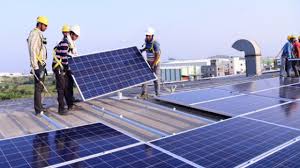
Is Solar Right for You? Assessing Your Home’s Solar Potential
The shift towards renewable energy sources is gaining momentum, and solar power stands at the forefront of this green revolution. However, the decision to install solar panels is not one-size-fits-all. It requires a careful assessment of your home’s solar potential. This blog aims to guide you through evaluating whether solar energy is a viable and beneficial option for your home.
Can Any Home Have Solar Panels?
A common question among homeowners is whether their specific home is suitable for solar panel installation. While solar technology has advanced significantly, making it accessible to a wider range of homes, there are still some important factors to consider.
Factors Determining Solar Panel Suitability
- Structural Integrity: The structural strength of your roof is crucial. Solar panels add extra weight, and your roof needs to be able to support this. Homes with older or weaker roofs may require reinforcement before installation.
- Roof Space and Design: The size and design of your roof affect how many solar panels can be installed. Large, unobstructed roofs are ideal. However, smaller or irregularly shaped roofs may accommodate fewer panels, impacting the system’s overall efficiency.
- Surrounding Environment: The environment around your home plays a significant role. Buildings, trees, or landscape features that cast shade on your roof can limit solar panel effectiveness.
Overcoming Challenges
Technological Advancements
Modern solar panels are more efficient and adaptable. Technologies like solar tiles or smaller, high-efficiency panels can be used in homes with limited or unconventional roof space.
Professional Assessment
A professional assessment can determine the feasibility of solar panel installation for your home. Solar providers often offer consultations to evaluate your home’s suitability and suggest the best solar solutions.
While most homes can accommodate solar panels, the effectiveness and efficiency of a solar system vary based on individual home characteristics. Professional assessment is key to understanding your home’s solar potential and exploring the right solar solutions to meet your energy needs and goals.

Understanding Solar Suitability
Geographic Location
- Sunlight Exposure: Your geographic location plays a crucial role in determining your home’s solar potential. Areas with higher sunlight exposure naturally offer more potential for solar energy generation. However, even homes in less sunny regions can benefit from solar panels, thanks to advances in photovoltaic technology.
- Regional Climate Considerations: Consider your local climate, including the number of sunny days and the intensity of sunlight your area receives. Regions with long winters or frequent cloudy days may see reduced solar efficiency but can still find solar power beneficial.
Analyzing Your Home’s Orientation and Roof
The orientation and structure of your roof are pivotal factors in the efficiency and feasibility of solar panel installation. Let’s delve deeper into how these aspects influence solar panel performance and what constitutes the most ideal roof for solar panels.
Roof Orientation and Solar Efficiency
- Directional Orientation: In the Northern Hemisphere, south-facing roofs are ideal for solar panel installation due to maximum sun exposure. East or west-facing roofs can also be suitable but may produce less energy compared to south-facing orientations.
- Roof Angle or Pitch: The angle of your roof affects the amount of sunlight solar panels receive. An ideal pitch is typically around 30 to 45 degrees. However, adjustable mounting systems can optimize the angle for solar energy capture.
Impact of Roof Design
- Size and Space: The available space on your roof determines how many solar panels can be installed. Larger, unobstructed roof spaces allow for more panels, which can generate more energy.
- Roof Condition: The age and condition of your roof are crucial. A roof in poor condition might need repair or replacement before solar panel installation to ensure it can support the panels’ weight and withstand environmental elements.
The Most Ideal Type of Roof for Solar Panels
- Material: Roofs made of composite or asphalt shingles are generally the easiest and most cost-effective for solar panel installations. Metal roofs with standing seams are also ideal as they allow for easy and secure attachment of panels.
- Durability: A durable roof material is key. Solar panels have a long lifespan, often 25 years or more, so the underlying roof should be able to last as long to avoid disrupting the solar system for roof repairs.
- Flat vs. Sloped Roofs: Both flat and sloped roofs can accommodate solar panels. Flat roofs may require additional mounting hardware to position the panels at an optimal angle.
Considerations for Non-Ideal Roofs
- Creative Solutions for Challenging Roofs: If your roof isn’t ideal for solar panels (e.g., due to shading, material, or structure), consider alternatives such as ground-mounted solar systems or community solar programs.
- Professional Assessment: A professional solar installer can provide a thorough assessment and offer solutions, including potential roof modifications or alternative installation methods.
A detailed analysis of your home’s roof orientation, condition, and type is essential in determining the feasibility and efficiency of a solar panel installation. While south-facing roofs with ample space are ideal, various solutions and technologies enable solar panel installation on a wide range of roof types and styles.

Assessing Energy Needs and Consumption
Continuing our comprehensive exploration of solar panel suitability for your home, we now turn to a crucial aspect of the decision-making process: assessing your energy needs and consumption. This evaluation is key in determining the scale and expected efficiency of a solar panel installation.
Analyzing Your Utility Bills
Start by examining your past utility bills, which can provide valuable insights into your household’s energy usage patterns. Look at your monthly energy consumption in kilowatt-hours (kWh) to gauge the typical energy demands of your home.
Evaluating Peak Energy Usage
Identify times of peak energy usage in your home. For instance, homes with high energy usage during daylight hours can benefit significantly from solar panels due to higher electricity production.
Tailoring the Solar System to Your Needs
Based on your energy consumption, you can estimate the size of the solar system required to meet your needs. A larger system may be necessary for homes with high energy usage, while smaller homes or those with lower energy needs may require fewer panels.
Considering Future Energy Changes
Think about potential changes in your future energy needs, such as adding an electric vehicle, installing a pool, or family size changes. These factors can influence the decision on the size and capacity of your solar installation.
Energy Efficiency Measures
Implementing energy efficiency measures before installing solar panels can reduce your overall energy consumption, making your solar system more effective. This can include upgrading to energy-efficient appliances, improving insulation, or replacing old lighting with LED bulbs.
Balancing Solar Production with Consumption
Striking a balance between solar energy production and your home’s consumption is key. An efficient system is one that adequately covers your energy needs without producing excessive surplus.
The Role of Net Metering
Net metering allows homeowners to send excess solar energy back to the grid in exchange for credits, which can be used to offset electricity costs when solar production is low. Understanding your area’s net metering policies is important in evaluating the overall benefit of installing solar panels.
Assessing your home’s energy needs and consumption is a critical step in determining the feasibility and design of a solar panel system. By understanding your energy profile and planning accordingly, you can ensure that your solar system is accurately tailored to meet your needs, maximizing efficiency and cost-effectiveness.

Financial Considerations
Initial Investment vs. Long-Term Savings
While the initial cost of solar panel installation can be substantial, it’s important to weigh this against the long-term savings on energy bills. In many cases, the reduction in monthly electricity costs can offset the upfront investment over time.
Incentives and Rebates
Research available government incentives, tax rebates, and grants for solar panel installations in your area. These financial incentives can significantly reduce the overall cost of going solar.
Return on Investment (ROI)
Calculate the potential ROI, considering the savings on energy bills, increased home value, and the lifespan of the solar panels. A favorable ROI is a strong indicator that solar panels are a worthwhile investment for your home.
Understanding the Benefits of Solar Energy
Once you’ve determined your home’s suitability for solar panels, it’s important to understand the array of benefits they offer. Solar energy isn’t just about electricity generation; it’s a step towards sustainable living and energy independence.
Reduced Dependency on Grid Electricity
Lower Energy Bills
Solar panels significantly reduce reliance on grid electricity, leading to lower monthly energy bills. Over time, the savings can offset the initial cost of installation.
Energy Independence
Solar energy provides a degree of independence from utility companies and protection against fluctuating energy prices.

Environmental Impact
Green Energy Source
Solar energy is a clean, renewable energy source. It reduces greenhouse gas emissions and reliance on fossil fuels, contributing to a healthier environment.
Sustainable Living
Adopting solar power aligns with sustainable living practices. It demonstrates a commitment to environmental stewardship and a greener future.
Enhancing Property Value
Increased Home Value
Homes with solar panel installations often have a higher market value. They are attractive to buyers seeking energy efficiency and lower utility costs.
Understanding the full scope of benefits offered by solar panels can solidify your decision to go solar. Beyond the financial savings, solar energy contributes to environmental conservation and enhances your property’s value. If you’re considering making the switch to solar, exploring these benefits in detail can help you make an informed choice that aligns with your personal and environmental values.
Choosing the Best Solar Panel Options for Your Home
Selecting the ideal solar panel for your home is a decision that involves balancing several factors, including efficiency, budget, architectural style, and personal energy goals. Let’s break down the different types of solar panels and the key considerations for choosing the best option for your home.
Types of Solar Panels and Their Suitability
- Monocrystalline Panels
- Efficiency: High
- Appearance: Sleek, dark
- Ideal For: Homes with limited roof space seeking maximum efficiency.
- Cost: Generally higher due to better efficiency.
- Polycrystalline Panels
- Efficiency: Moderate
- Appearance: Blue, speckled
- Ideal For: Budget-conscious homeowners with adequate roof space.
- Cost: More affordable than monocrystalline panels.
- Thin-Film Panels
- Efficiency: Lower
- Appearance: Thin, flexible sheets
- Ideal For: Non-traditional roofs or surfaces where weight is a concern.
- Cost: Varies, generally less expensive but requires more space.
Assessing Roof Compatibility
- Roof Type: Certain solar panels are better suited to specific roof types. For instance, lightweight thin-film panels may be preferable for roofs that can’t support heavier loads.
- Condition: Ensure that your roof is in good condition and can endure the installation and long-term presence of solar panels.

Analyzing Sunlight Exposure and Shading
Conduct a site assessment to understand the sunlight availability and potential shading issues on your roof. This will help in determining the most efficient placement and type of solar panels.
Balancing Budget and Efficiency
Compare the initial installation costs against long-term energy savings. Higher efficiency panels like monocrystalline might have a higher upfront cost but can provide more savings over time.
Aesthetic Impact on Your Home
Consider how the solar panels will look on your roof. The choice between sleek monocrystalline panels and the more noticeable polycrystalline panels might depend on your aesthetic preference and the style of your home.
Seeking Expert Advice
Consult with solar energy experts to evaluate your home’s specific needs. Professional guidance can ensure that your choice of solar panels aligns with your home’s architecture, energy requirements, and budget.
Understanding Long-term Sustainability
Reflect on your long-term sustainability goals. Consider the durability, warranty, and environmental impact of the solar panels you choose.
The journey to finding the right solar panels for your home involves a careful examination of your home’s characteristics, your personal energy needs, and your financial plans. By understanding the different types of solar panels and how they match various factors, you can make a well-informed decision that brings you closer to sustainable living.
Determining whether solar is right for you involves a multifaceted assessment of your home’s location, energy needs, financial aspects, and environmental goals. Every home is unique, and so is its solar potential. Careful evaluation and planning can help you make an informed decision that aligns with both your personal and environmental values.

Leave a Reply